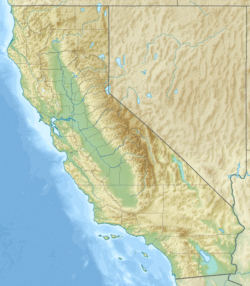Little Kern River facts for kids
Quick facts for kids Little Kern River |
|
|---|---|
|
Location of the Little Kern River in California
|
|
| Country | United States |
| State | California |
| Physical characteristics | |
| Main source | Great Western Divide Sequoia National Forest 10,603 ft (3,232 m) 36°23′57″N 118°34′19″W / 36.39917°N 118.57194°W |
| River mouth | Kern River Forks of the Kern 4,790 ft (1,460 m) 36°08′00″N 118°26′20″W / 36.13333°N 118.43889°W |
| Length | 24.4 mi (39.3 km) |
| Basin features | |
| Basin size | 133 sq mi (340 km2) |
The Little Kern River is a 24.4 miles (39.3 km) long river in California. It is a main branch of the upper Kern River. You can find it in the Sequoia National Forest, located in the southern Sierra Nevada mountains.
This river is special because it is one of only three streams where you can find the beautiful golden trout (Oncorhynchus mykiss aguabonita). The other two streams are Volcano Creek and Golden Trout Creek.
Where the River Flows
The Little Kern River flows through about 133 square miles (340 km2) of wild land. All of this area is in Tulare County.
The river starts high up at Bullfrog Lakes. This area is part of the Golden Trout Wilderness, which is south of Farewell Gap and near Mineral King.
From its start, the Little Kern River flows south. It passes by places like Table Meadow and Burnt Corral Meadows. Then, it enters a deep, narrow valley called a gorge. Finally, it joins the main Kern River at a spot known as Forks of the Kern.
The Little Kern River helps mark the southwest edge of the Great Western Divide mountain range. Where it meets the main Kern River, it shows the very southern tip of this range. Forks of the Kern is about 40 miles (64 km) upstream from Lake Isabella.
Protecting Golden Trout
Since the 1960s, a lot of effort has gone into protecting golden trout. These fish are very special to the Little Kern River and nearby streams.
To help the golden trout, special areas were created in the upper parts of the South Fork Kern River. Teams built three barriers (Ramshaw, Templeton, and Schaeffer) to keep other types of fish out. They also treated the water to remove non-native fish that could harm the golden trout. These efforts helped create safe homes for the golden trout to thrive.
 | Kyle Baker |
 | Joseph Yoakum |
 | Laura Wheeler Waring |
 | Henry Ossawa Tanner |


